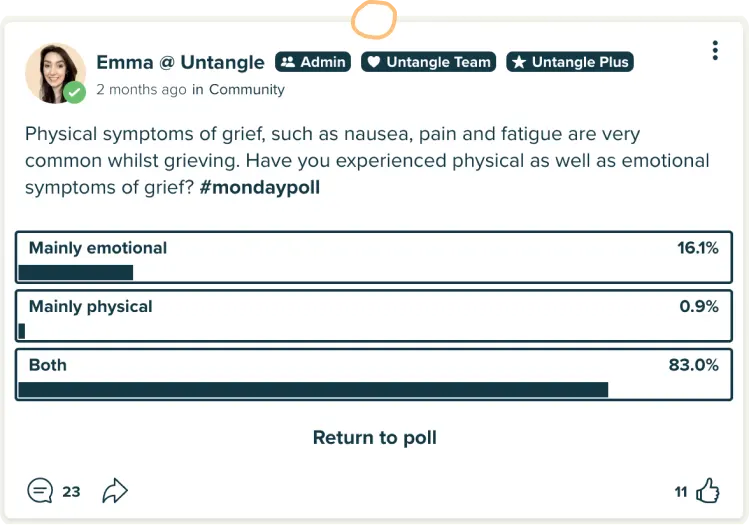To anyone who hasn’t been through a bereavement, the symptoms of grief might seem obvious. But those of us who have experienced loss know that the symptoms go far beyond feeling sad (although there’s lots of that too) – grief affects your whole body and mind in ways that can take you by surprise.
We talk a lot about our grief symptoms at Untangle, and if we’ve learnt one thing from a recent poll on our community, it’s that everyone’s journey is unique. We’re also acutely aware of the stigma surrounding death and grief, and that finding good advice can be hard – so, here, we’re listing some of the most common symptoms our community has experienced, along with tips on how to best manage those symptoms…
Jump to section:
The emotional symptoms of grief
What does grief feel like? There are so many emotional symptoms of grief and they tend to come in waves. One day you might be feeling terribly lonely, and the next you could be overcome with anger at the unfairness of it all.
These are just some of the emotions you may experience…
Anger
It’s completely normal to feel angry about no longer having your loved one around.
It can feel so unfair that the world is still turning, yet the person you miss is no longer here. This can surface as blaming someone or something – it’s a way of trying to release some of the pain trapped inside of you.
Depression
“The fatigue and overwhelming sadness are all-encompassing.” Viki, Untangle member
Sadness, despair and depression are the overriding emotions we feel when grieving, and they take on a whole new meaning when you’re missing someone you love.
Guilt
Guilt is a powerful emotion. It can isolate us and alter how we look at the world. When linked to bereavement, guilt is often a burden we put on ourselves rather than something that others make us feel.
Realistic guilt exists when we have done something we knew was wrong, but we may also unrealistically blame ourselves for things over which we have no control.
Guilt causes us to punish ourselves and keeps us focused on the past. You may find it helpful to look at Lois Tonkin’s ‘Growing around Grief’ metaphor. This is a helpful way of thinking about moving forwards with your grief. Although it doesn’t ever completely go away, the painful feelings come less often.
And remember, just because you feel guilty doesn’t mean you are guilty.
Numbness
Months – heck, even years after losing a loved one – shock can take over. This can lead to numbness; as if all of your emotions have been dulled or tuned out.
This in some way acts as an emotional shield, enabling you to carry on with the stresses of life after loss. That said, numbness can be an incredibly frustrating experience, in that it can make you question your own view of relationships (as was my experience).
Loneliness
Grief can be very isolating. Not only have you lost a loved one, but it can feel as though those around you don’t understand what you’re going through, particularly if your close circle hasn’t experienced loss before.
Loneliness, sadly, is all too common after the death of a loved one. Even if others rally around to offer support, it’s easy to feel alone in your crowd.
Relief
Feeling relieved after someone has passed doesn’t mean you didn’t care or that you loved them any less. Some Untangle members have stated that they felt a sense of relief, having cared for a loved one for such a long time; others have stated that it was time for their loved one to go after battling an illness. Put simply, every relationship is different; every loss is unique.
“I felt a great sense of relief after she passed- I loved her so much, but towards the end, I felt tied to a person I didn’t recognise as her. It’s such a bittersweet feeling.”
Jamie, Untangle member
How to cope with the emotional symptoms of grief
Whether it’s anger, guilt or depression you’re feeling after a bereavement, it may be a good idea to explore grief counselling to help you work through difficult emotions.
We suggest taking a look at the different types of bereavement therapy available, and then using our free therapist matching service to find the right style of counselling for your needs.

As well as getting professional advice, it’s helpful to have a support network you can talk to.
Turn to friends and family members you can trust, and be honest and open about how you’re feeling.
Sometimes, after a bereavement, the people who are there for us might be the ones we least expect. That’s okay; embrace these friendships. You deserve kindness and compassion right now.
Look to support groups and communities that can relate. Untangle was built entirely to help you – and others who are grieving – feel less alone at the most difficult times in your life. Our community is there for you 24 hours a day, 7 days a week.
– Download the Untangle app to get started –
The physical symptoms of grief
With how intense losing someone can be, it’s not surprising that, alongside emotional symptoms, there are many physical symptoms of grief.
From aches, and tiredness, to digestive issues, these are some of the side effects you may be experiencing…
Aches & pains
There are many reasons aches and pains can crop up or worsen when you’re grieving. It’s a mixture of tiredness; lack of routine; tensions that tighten up your muscles; and deep sadness that feels all-consuming.
You might get more headaches than usual, or a recurring bad back problem could heighten (more so than it has before).
Fatigue
Fatigue is common with intense grief, as both shock and sadness can exhaust your body.When you become so run down, it’s easier to pick up more illnesses (your immune system isn’t as reactive as it was before). If you notice you get sick more often now, grief fatigue could be one of the reasons.
“When my husband first died in November I couldn’t eat for months, had water infections, vomiting and slept around the clock.” @ericagh21.
Panic attacks
Think of all that you’re going through; it’s no wonder that your ‘fight or flight’ response might kick in.
You may notice there are certain triggers for these attacks, such as if you go somewhere that meant something to your loved one or when dealing with someone’s belongings after they’ve died.
Insomnia
Even if you feel exhausted, it’s still possible to experience insomnia. Sure, you’re tired, but sleep is seemingly impossible whilst processing a whole new reality.
When you’re left alone with your thoughts, it’s not uncommon to go over and over (and over) them, trying to make sense of a world without your loved one.
Digestive issues
If your eating habits have changed as a result of grief, or your body just feels extremely run down, you might experience vomiting, nausea and digestive issues.
“The first two weeks I had a lot of digestive problems,” explains @amberranae0974. “I also had panic attacks. My doctor gave me meds and they helped.”
How to cope with the physical symptoms of grief
While medicines can help with pain relief and insomnia (and are worth talking to your doctor about), it’s also important to keep nurturing your body with food, exercise and routine. We’re creatures of habit, after all.
This can be easier said than done – all sense of schedule can go out of the window when after loss – but try reintroducing a routine with small steps. Take it day by day.
You could begin by deciding that, for a whole week, you’re going to get out in nature for a 20-minute walk each day. Exercise not only boosts serotonin, but exposure to daylight can also regulate your body clock, so you may sleep better at night.

One of our members mentioned that going on daily walks wasn’t just time for exercise, but also for connection:
“A friend who had lost her daughter told me to start running or walking. I initially thought this was ridiculous as the last thing I wanted to do was get fit but realised this was my time with her. I would listen to her videos and her favourite songs.”
For the next week, decide whether you’re ready to make another routine improvement. If you are, put the focus on food and giving your body the vitamins it needs to handle grief.
Keeping yourself well nourished can help with sleeping issues, aches and pains, as well as digestive issues. We know how difficult it can be to take care of yourself when your world has turned upside down, that’s why we asked Nutritional Therapist, Joanne Crovini, to offer advice on how to eat well after a loss.
The cognitive symptoms of grief
‘Grief brain’ or ‘grief fog’ is a real thing. When you’re coping with grief, trying to concentrate on anything else can feel almost impossible.
Here are some of the signs that grief is affecting your day-to-day cognitive function…

Confusion
Suddenly, everything feels so confusing. Even if you’re usually good at understanding documents, the sheer amount of ‘grief admin’ you have to go through can leave you completely overwhelmed.
Companies don’t always make this easy either (see what to do when someone dies), which is why seeking support can be an important first step when it feels like your brain is more scattered than usual.

Lack of concentration
Don’t be hard on yourself if you’re finding it difficult to pay attention to… well, anything. It’s a natural response to grief, and your mind has a lot to process right now.
“Mentally I’m a mess, I forget things, I don’t concentrate, I cry every day, my anxiety is terrible, I’m not me anymore,” says @jay.

Forgetfulness
Just as you might be finding it hard to concentrate, you may catch yourself forgetting things more often too. Again, this is because your brain is overwhelmed with the many thoughts and emotions you’re coping with.
“I had to take leave from my job for several months because I was making mistakes and forgetting, and I was afraid of being fired,” @birrrdegg says.
How to deal with the cognitive symptoms of grief
The cognitive symptoms of grief can have the biggest effect on your work, so don’t be afraid to have some honest conversations with your employers and colleagues if you’re struggling. Take a look at our Bereavement & Work guides for more advice on this, including returning to work after a loss.
These cognitive symptoms can also be frustrating when you’ve got lots of ‘grief admin’ to tackle, so take a look at our guide on what to do when someone dies for step-by-step advice. Think of it like a checklist that you can tick off as and when you feel ready. Take it at your own pace, and don’t hesitate to ask for help along the way.
This frame of thinking means you can both be growing and grieving at the same time. Whilst there may always be a ping of sadness resting on your shoulder, you can make progress. Grief doesn’t go away, nor should you expect it to, but you can grow around it.
If you want to share how you’re feeling, ask questions to others who have lost or simply read their stories, head on over to the Untangle community via the Untangle Grief app.
FAQs
How long do the physical symptoms of grief last?
The truth is, there is no one-size-fits-all answer. Everyone’s experience of grief is different. For some, it never truly ends but becomes more manageable over time as they learn to live alongside grief. This is true for the physical, emotional and cognitive symptoms.
See our ‘How long does grief last?’ article for further insight.
What does grief do to your body?
Grief is physically exhausting, and an exhausted body doesn’t function at its best. This is why you might experience headaches, muscle aches, extreme tiredness, insomnia and even digestive issues. When you’re run down, your immune system is also affected, so you may catch colds or infections more easily. This is why being kind to yourself through grief is so important.
Can grief make you physically unwell?
Yes. A lot of Untangle members have talked about feeling sick and nauseous when going through the stages of grief, and it’s no surprise – stress and trauma are a lot for your body to handle. Be kind to yourself when you’re struggling, and speak to a doctor if you feel like your symptoms are unmanageable.




